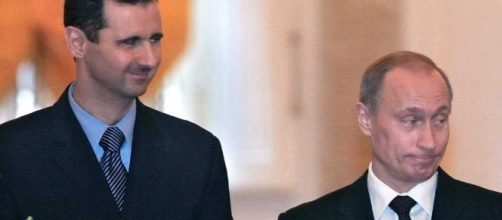In a recent article by Blasting News about Russia's relationship with the U.S. over their cruise missile attack against the Assad regime, it mentions that New America Fellow Doug Ollivant and political science professor from Columbia University Kimberly Marten were on the PBS Newshour on the Saturday after the attack. Marten said about the chemical strikes by the Syrian government that Tuesday was embarrassing for Russian president Vladimir Putin, who promised back in 2013 that he could convince the Assad regime to get rid of those chemical weapons because it undercut his role in that promise.
But she also said that she didn't feel “big brother's” (Russia) response over America's attack on their ally was going to be that severe despite the fact that Syrian soldiers were killed at the airbase that was targeted. She bases this on the fact that no Russians were killed, neither were their jets targeted and that they had been told about the strikes ahead of time. Along with that, she included the fact that Syrian planes were hit and that there were casualties was an indicator that even though the Russians were told in advance, they had not told the Syrians. In a way, it was a payback for that embarrassment.
Syria embarrassed Russia with chemical weapons
When asked by Newshour's Hari Sreenivasan if there was any daylight between Russia and Syria, Ollivant said the Russians were certainly invested in Syria, that the country was important to them and that their use of chemical weapons was certainly embarrassing to Putin.
But he could not understand why the Assad regime would provoke the international community and embarrass their patron, the Russians. He also added that it's not unusual for the Russians to let the Syrians feel the brunt of this attack so that they don't use chemical weapons again.
While Putin might have been embarrassed and if true that they let the al-Shayrat airbase be attacked, the international community still seem to be somewhat sold on the idea that the Russians are infuriated by the U.S. military strikes. Rex Tillerson's visit to Moscow last week was reported as tense between Russian Foreign Minister Sergei Lavrov and Putin himself. It was also reported around this time that they had doubled-down their support for the Assad regime, even stating that the U.S.
were planting chemical weapons in the country to find reasons for waging war. They also referred to President Bush's excuse for waging war in Iraq by lying about chemical weapons there.
Trump administration's leverage
With more distance away from the military strike over the weekend, it seems there's more clarity on the reason behind it being strictly and only about Assad's use of chemical weapons. This was not the only time the regime has reportedly used them as another attack had been reported over the previous weeks and even during the last year. Blasting News reported on a decision by the UN Security Council towards the end of last year where the Russians denied Assad had used them and even rejected reports that would lead to accountability.
U.S. Ambassador to the UN Nikki Haley and Secretary of State Rex Tillerson have separated from President Trump's view of wanting regime change to demand it and even confronted Russia over their support for Assad. In a statement on Tuesday, Rex Tillerson suggested that Russia side with Western countries against Syria, Iran and their military arm of Hezbollah questioning whether their relationship with Assad would serve them well in the long term. Recently, Blasting News also reported on Russia's response to the United States' attack by sending a frigate to the Mediterranean over the weekend, and as mentioned with Putin doubling-down on their support for the Assad regime.
Putin's conspiracy about U.S. planting chemicals in Syria
Russian President Putin warns of planned 'false-flag' chemical operations in Syria https://t.co/L3mEi8jTFn pic.twitter.com/Ar7GaIlUQW
— Ruptly (@Ruptly) April 11, 2017
In the mentioned article, it says that during a press conference before Tillerson's arrival, Vladimir Putin said that they had gathered intelligence telling them that the U.S. were planting chemicals in Syria's Southern region near Damascus in order to blame the Syrian government. Russia state media has reported on the chemical attacks but apparently not showing the victims as seen in Western media, saying that the weapons belonged to rebels who oppose Assad (who Russia and Assad consider terrorists) and were storing them in buildings that were hit by air strikes on Tuesday, April 4.
The U.S. accused Russia of creating false narratives and that they might have evidence that shows Russia was likely behind it. But even Syrian state media has reportedly said that the footage seen of children being hosed down after the Chemical Attack, is staged and a hoax. Much of these accusations have spilled out into social media and created more conspiracies.

